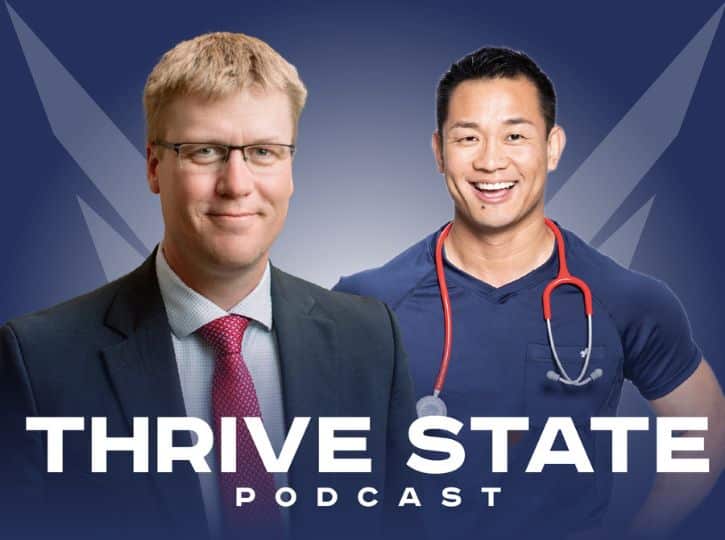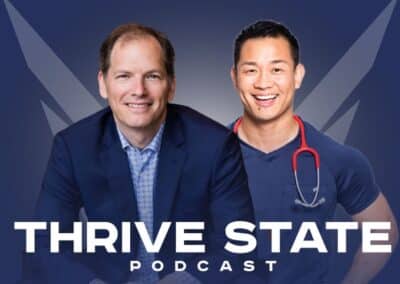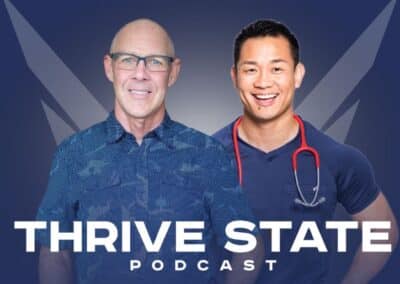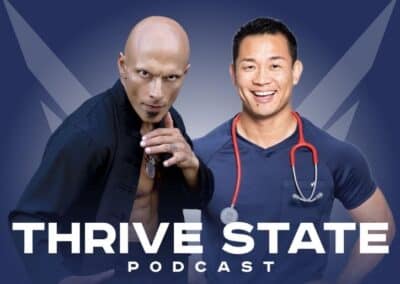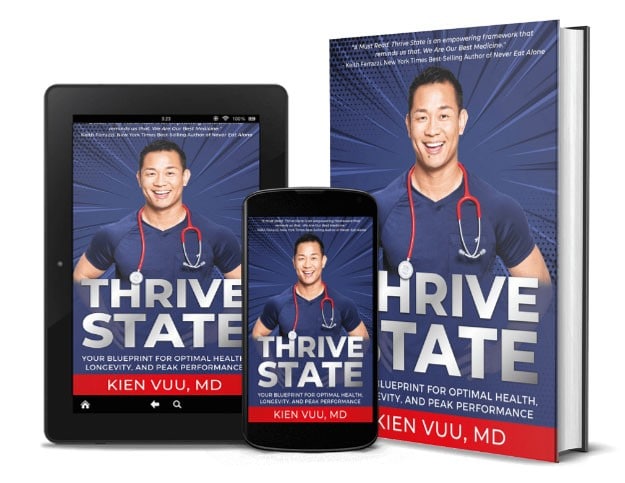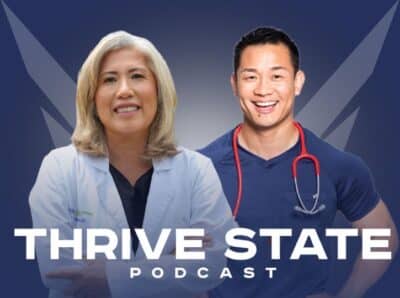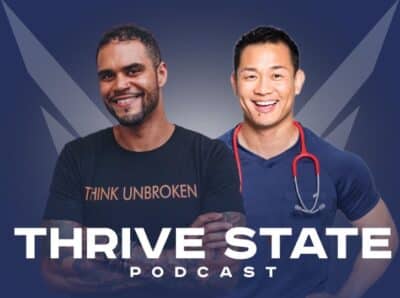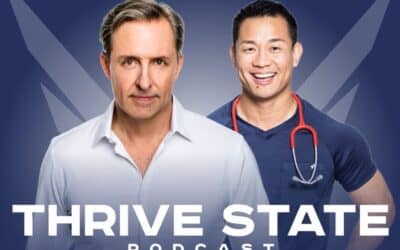Episode 107: Timothy Nelson MD, PhD
Aside from the lifestyle factors that play a massive role in the whole picture, the fact that the heart muscle is one of the tissues in the body that does not regenerate very well. In a year, it only grows (or regenerate) just about 1%. This makes it inadequate to repair the damaged tissues in heart attacks or missing parts in congenital conditions.
But—are you ready to hear about the future of regenerative medicine? Science is trying to find fertilizers and seeds that we can use to stimulate heart muscle regeneration. A fundamental game-changer is now in the works, and Dr. Tim Nelson’s Heart Works is the world’s first to offer the pioneering ability to bio-engineer new seeds to grow new heart muscle.
In the recent episode of the Thrive State Podcast, we had the opportunity to have Timothy Nelson, MD, PhD, a world leading regenerative medicine expert, unpack for us this exciting news and miracle.
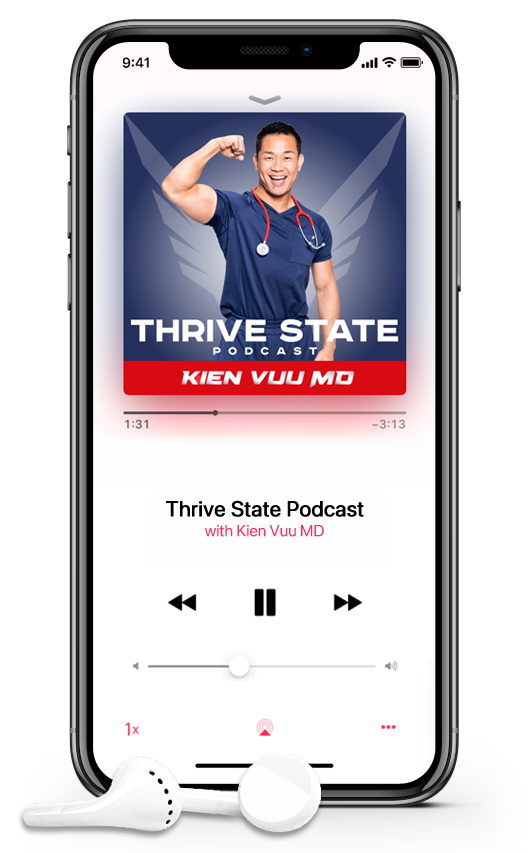
Dr. Nelson, a scientific physician as he calls himself, is the director of the Todd and Karen Wanek Family Program for Hypoplastic Left Heart Syndrome at Mayo Clinic, Rochester, Minnesota, and a general internal medicine practitioner, with a specialty interest in regenerative medicine. His areas of expertise include congenital and degenerative heart disease, clinical trials for regenerative medicine, and stem cell therapies. translational transplant medicine, and application and ethics of stem cell technologies in treating degenerative diseases.
A Cure is in the Works! Can you believe it? The exponential power of cellular therapies has expanded massively beyond the bone marrow transplant that we know from decades ago. And these advances continue to give hope to millions of people while educating millions more about the regenerative power of our bodies.
Find out more about Dr. Nelson’s amazing work at heartworksinc.org. And support the fundraiser for A Cure is in the Works 2023 through webuildhearts.org.
Find Dr. Tim Nelson on LinkedIn: https://www.linkedin.com/in/tim-nelson-cause2cure/
Show notes
06:47
- Started in bone marrow transplant. Having to wipe out their immune system and reconstitute that with someone else’s stem cells is a miracle of medicine.
- The evolution of CAR-T therapy has taken that to a whole new personalized level. There’s so many opportunities to leverage cell-based therapies to make small and big parts of our health better.
09:15
- If we ground your body up and measure how old your physical body is, it’s the best estimate that the average age of the cells in your body is 7-10 years, no matter how old you are.
- Regenerative medicine happens every hour, every day to the degree we don’t fully comprehend. The drugs we take, the exercise we do, and the food we eat and how that affect our regenerative ability have probably the biggest impact on how we age, how we recover, and how we grow. These are areas we weren’t taught in medical school, but science made us realize how important it is to protect and promote the regenerative capacity of our body. And that unlocks the miracle of medicine in the future.
12:13
- One of the tissues in our body that does not regenerate very well is the heart muscle—just about 1% growth rate in a year. This makes it inadequate to repair heart attacks or missing parts. Science is trying to find fertilizers and seeds that we can use to stimulate the heart.
- The fundamental game-changer that Heart Works is the world’s first to offer is the ability to bio-engineer new seeds to grow new heart muscle. This technology of producing autologous heart muscle has the potential to cure many diseases.
15:26
- Because of the economics of producing autologous tissue (one product: one patient), most people argue it’s not feasible, practical, and sustainable. I believe otherwise. An example of that is bone marrow transplants that we’ve done for decades. That doesn’t mean it will not be expensive and it is not right for everybody.
- If you replace tissue with an allogeneic tissue, you will need immunosuppression so your body will not reject it. Hence, there’s a real possibility, for example in a heart transplant, that you’re trading one disease for another because you may be able to live longer with the new heart but will develop some kind of cancer in the future because your immune system has been knocked down. So using autologous heart muscle is a much healthier, ideal way of doing it.
19:15
- From a regulatory standpoint, in the US, people are not allowed to pay to participate in a clinical trial, which is not the case in other countries. This maybe is the fundamental difference in terms of regulation.
23:59
27:41
Relevant Links:
- How to Keep Your Head On Straight in 2021
- Talking Sh*T !!! How Your Gut Affects Your Health and Performance
- Listening to Your Inner Truth
- Ultimate Performance Tools of the Titans
- Hacking Your Movement and Breath for Peak Performance
- Making of a SuperHero body with Celebrity Nutrition Expert with Rehan Jalali
- World Building
- The Healing Power of Decision
- Courageous Love - Overcoming Assault, Addiction, and Divorce
- The Easy Way or The Heart Way - Master Your Cardiovascular Health
- The Medicine of Authenticity and Intuition
- The Healing Power of Being in the NOW
- Living with No Regrets After "She Bangs"
- Say Yes to NO - Nitric Oxide as the magic molecule to Erections and Vascular Health
- Former Miss California Reveals Health Insights from the World of Pageants
- Finding Your Community Through Purpose
- The Synergistic Healing Energies of Culinary Alchemy
- Leading Yourself to Success While Having Fun
- Love is the Strongest Medicine
- Get Healthy AF with a Habits-Based Approach
- Light Em Up - The Performance Benefits of Red Light Therapy
- A Game Changing Approach to Peak Performance
- Transform Yourself and Your Love Life with Integrity Dating
- What the F*&$ is Performance Medicine???
- How to BioHack and Manifest Your Best Life
- Epigenetics - How to Control Your Genetic Destiny
- Mindset and Moonshots
- Sexual Biohacking: Secrets Revealed to Getting Turned On
- Sugarproof: How to Protect You and Your Children against Disease
- Healing DIS-ease with Qigong
- Live to 200: The Science and Technology of Growing Young
- Powerful Mental and Emotional Hacks to Health and Success
- Stop Emotional Eating NOW - Secrets to Never Having to Diet Again
- How to Activate Your Thrive State
- Overcoming Dyslexia and Turning Ferrari Clients into F1 High Performers
- The Vision and Mindset of Achieving Anything You Want
Other YouTube videos to enjoy:
- How to Cook Rice | White Rice vs. Brown Rice | Is Rice Healthy? | Red Rice, Black Rice, Purple Rice
- Sugar is more addictive than Cocaine!? | Why sugar is bad for you | How to quit sugar
- How Stress Affects Your Mind and Body | Chronic Disease | Stress Relief | Doses of Fun
- Morning Routines | Successful morning habits | My Best Healthy Morning Routine
- Are You Really Happy? How to be happier? | The secret to Happiness
- Men Lifestyle & Health Tips | 11 Ways to Stay Sexy | Kevin Kreider | KienVuuMD
- FINDING YOUR PURPOSE | Motivational Video | Daily #motivation #Inspirations #Passion
- MOTIVATIONAL | INSPIRATIONAL VIDEO | Health is a CHOICE | The POWER of CHOICE
- Viome - Naveen Jain | How poop can affect your health!
- Philly Cheese Steak! Why it should be a Recreational Indulgence | Diet Choices

